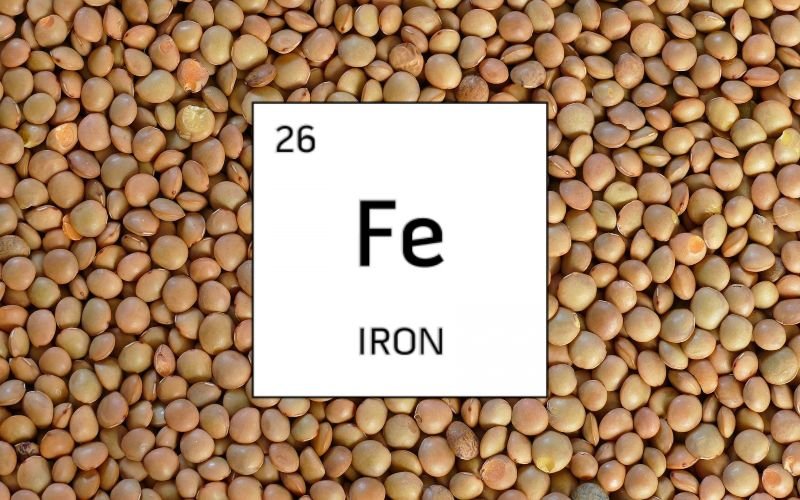20 Best Nutrients For Brain Health According To Science

Are you looking for ways to keep your brain healthy and sharp? With so much information out there, it can be difficult to know what nutrients will be most beneficial for your brain.
Fortunately, there are a few key nutrients that have been proven to help with mental clarity, focus, and overall brain health. From omega-3 fatty acids to B vitamins, these 20 best nutrients for brain health can help improve your brain’s performance and keep it healthy throughout your life.
With the right combination of these essential nutrients, you can ensure that your brain remains sharp, focused, and healthy.
Best Nutrients For Brain Health
Omega 3 DHA
Omega 3 DHA is beneficial to our brains because it is a source of healthy, unsaturated fatty acids. It is commonly recommended that we get no less than 200 mg of DHA per day. One of the best sources of DHA is seafood, but unfortunately, many people are allergic to seafood or simply do not like the taste.
Another great option is taking a daily DHA supplement. Omega 3 DHA can help to reduce unhealthy inflammation throughout the body and strengthen your immune system. It also has been proven to reduce the risk of developing Alzheimer’s disease and other forms of dementia by as much as 50%.
Blueberry Extract
Blueberries contain large quantities of anthocyanins which are potent antioxidants that protect against a variety of diseases and age-related illnesses.
Regular consumption of blueberries can help reduce the risk of cardiovascular diseases, metabolic diseases, and certain types of cancer. Blueberries are also known to improve brain function and prevent cognitive decline.
Vitamin B12
Vitamin B12 is one of the best nutrients for brain health because it supports healthy mental function and a healthy nervous system. It is important for the development of healthy red blood cells, DNA integrity, and a healthy metabolism. It also supports healthy mood, focus, and clarity.
Vitamin B12 is recommended for people who are pregnant or breastfeeding, seniors, and people who are experiencing mood issues like depression, anxiety, or trouble focusing and concentrating.
Vitamin D3
Vitamin D3 is another great nutrient for a healthy brain because it increases serotonin levels in your body, improves your sleep, lowers the risk of depression, and reduces the risk of dementia.
Many foods are rich in Vitamin D, such as salmon, tuna, eggs, and fortified milk. You can also get Vitamin D from sunlight. If you live in a cold climate and do not get enough sunlight, then you might need to consider a Vitamin D supplement.
Vitamin C
Vitamin C is considered the gig of vitamins due to its ability to fight effectively free radicals and oxidative stress. Numerous studies have been done about the vitamin C effect on the brain.

This vitamin is known to reduce the risk of developing Alzheimer’s, improve focus and concentration, and reduce anxiety. How? Vitamin C is proven to fight stress and anxiety. It also increases your serotonin levels, which can help with sleep and focus. Furthermore, it combats stress, which is the cause of anxiety and can improve focus.
Omega 3 EPA
Omega 3 EPA is the most active form of fish oil that helps in reducing blood pressure, prevents blood clots, reduces inflammation and also improves heart health. It is also used as a natural anti-depressant, reduces anxiety and helps in the treatment of ADHD. Additionally, it improves the health of the neurological system, boosts eye health and maintains healthy skin.
Vitamin A
Vitamin A is a potent antioxidant that works together with vitamin E in the body, and is essential for vision, gene expression, and normal growth and development. It is also important for keeping the nervous system healthy, which is critical for maintaining mental health.
Vitamin A deficiencies have been linked to an increased risk of anxiety and depression, and low levels of vitamin A have been found in patients with Alzheimer’s disease. Furthermore, it has been shown that vitamin A may help reduce the risk of stroke, which is a serious concern for people with anxiety and depression.
Folic Acid (B9)
Folic Acid or Vitamin B9 is another beneficial brain nutrient. It is helpful in the development of the nervous system in the fetus, as well as the production of DNA. Also, folic acid helps to reduce the levels of homocysteine (an amino acid) in the blood, which is associated with a higher risk of various diseases.
Homocysteine has been linked to Alzheimer’s disease, cardiac diseases, and other health problems. Therefore, folic acid helps to keep your nervous system healthy and functioning optimally.
Biotin (B7)
Biotin or Vitamin B9 is a great brain-boosting nutrient because It has been found to improve focus and concentration, reduce anxiety, and boost your mood. It is also very helpful in improving your memory, metabolism, and reducing the risk of diabetes.
Vitamin B6
Vitamin B6 is a very important vitamin that can benefit your brain health, improve your mood, and reduce your risk of Alzheimer’s disease and other types of dementia. Vitamin B6 is also helpful in reducing symptoms of anxiety and OCD.
Vitamin B6 is found in a variety of foods including turkey, tuna, bananas, and beans. You can also take vitamin B6 as a supplement to help maintain optimal levels of this important vitamin for your health and well-being.
Vitamin B5
Vitamin B5 is very important for brain health because it is essential for synthesizing amino acids in the brain. Amino acids are the building blocks of proteins, and proteins are essential for normal brain function. Vitamin B5 is also important for supporting healthy brain cell membranes in your brain.
Vitamin B3
Vitamin B3, also known as niacin, is essential for brain health and mental well-being. It has been shown to improve mood, memory, focus, and working memory, as well as decrease anxiety and stress.
Vitamin B3 helps to ensure an adequate energy supply to the nerves and brain and its deficiency can lead to neurodegenerative diseases such as Alzheimer’s and Parkinson’s.
Nicotinamide Riboside (NR), a form of vitamin B3, was found in a study to neutralize neuro-inflammation which leads to DNA damage in brain cells of mice that had been generated to have Alzheimer characteristics.
In addition, B vitamins, such as B6 and B12, are necessary for the brain’s normal functioning, and any deficiency in them may increase the risk of memory loss and other forms of cognitive decline. Therefore, it is important to make sure to include Vitamin B3 in your diet to reap its numerous benefits for brain health.
Vitamin B2
Vitamin B2 is an essential nutrient for brain health. It is a water-soluble vitamin that is needed for the production of neurotransmitters, which are chemical messengers that send signals between the brain and the rest of the body. It is also needed to break down fatty acids and cholesterol, which is important for brain health.
Vitamin B2 also helps in the synthesis of acetylcholine and norepinephrine, which are important neurotransmitters, and is also necessary for the production of myelin. It is also needed for the synthesis of NADPH, which is an important co-enzyme in the synthesis of neurotransmitters.
Vitamin B1
Vitamin B1, also known as thiamine, has been proven to prevent brain damage and improve cognitive function. It is an essential nutrient that is important for our nervous system, heart and muscles to work properly.
The brain is particularly sensitive to thiamine deficiency, as it contains high levels of enzymes that depend on this vitamin for their activity. The brain also uses a lot of energy—approximately 20% of the body’s total glucose supply—and without enough thiamine, it cannot effectively use this energy source.
A lack of thiamine can lead to impaired functioning of the brain and nervous system, including memory problems, confusion and difficulty walking or speaking clearly.
Vitamin E
Vitamin E is an antioxidant that has been shown to have a positive effect on brain health. It helps the body keep cholesterol from oxidizing, which can lead to the formation of plaque in the brain.
Vitamin E is also important for the proper functioning of nerve cells. It also improves blood flow to the brain and helps prevent neuron death.
A deficiency in Vitamin E can cause nerve damage and other problems with cognition.
Chromium
Chromium is a mineral that plays an important role in regulating blood sugar, insulin, and blood sugar levels. A number of studies have shown that chromium supplementation may help to reduce blood sugar levels and therefore reduce the risk of diabetes.
Chromium has also been shown to have neuroprotective properties and may help to reduce the risk of neurodegenerative diseases like Alzheimer’s disease, Parkinson’s disease, and depression.
Iron
Iron contributes in a variety of key biological functions of the brain, such as transering oxygen, synthesizing DNA, mitochondrial respiration, myelin creation, and neurotransmitter production and metabolism. Iron homoeostasis is required for proper physiological brain function, however dysregulation of iron homoeostasis can produce neurotoxicity via many pathways. [1]

Iodine
Iodine is an essential nutrient which helps develop and maintain the structure of the brain. It is vital for the proper functioning of the thyroid gland and, therefore, is necessary for a healthy mind and body.
Iodine is also important for the proper functioning of the central nervous system. In fact, when the brain is deprived of iodine, it can lead to a condition known as cretinism, which is characterized by a severe mental retardation and physical deformities.
Selenium
Selenium is an essential mineral that is found in soil, water, and air. It has a critical role in the prevention of oxidative stress and its deficiency may lead to neurological disorders.
A peer review and meta analysis published in the scientific journal “Nutrients found that a selenium-rich diet is associated with a decreased risk of developing Alzheimer’s disease, and a decreased level of oxidative stress. [2]
Zinc
Zinc is important for brain health and brain development. It is essential for the formation of the cellular structure of the brain, the growth of new brain cells, and the production of neurotransmitters. It also plays a role in the repair and maintenance of brain tissue. Zinc is used in the formation of the myelin sheath, which is the fatty layer that protects the nerves in the human brain.
Zinc is important for your brain health and brain development. Zinc is essential for the formation of the cellular structure of the brain, the growth of new brain cells, and the production of neurotransmitters. It also plays a role in the repair and maintenance of brain tissue.
Zinc is used in the formation of the myelin sheath, which is the fatty layer that protects the nerves in the human brain.
Brain Supplements To Consider
If you want to skip the hassle of finding which foods you need to consume to get all the nutrients your brain needs, you can start taking brain boosting supplements.
These supplements have all the nutrients you need in the right quantities.
Neuroactiv6 Review: Best Brain Boosting Nootropic?
CollaGenius Review: Ingredients, Pros & Cons, Side Effects
Cognibiotics Review: Pros & Cons, Ingredients, Price
Alternatively, you may want to check this article we wrote a while ago about the 6 foods your brain needs according to a Harvard nutritionist or this article about a researched based brain nourishing juice.
Bottom Line
The article provides 20 different nutrients that are essential for brain health. By following the healthiest diet possible, you can maximize your brain power and improve your memory. These nutrients can be found in a wide variety of foods, so there is no need to become a dietitian or a nutritionist.
With a little planning and some healthy food choices, you can make sure your brain has the nutrients it needs to keep you sharp for a long time.
This article provides the best possible sources of nutrients that are necessary for brain health. By following a healthy diet, you can maximize your brain power and improve your memory. These nutrients can be found in a wide variety of foods, so there is no need to become a dietitian or a nutritionist. With a little planning and some healthy food choices, you can make sure your brain has the nutrients it needs to keep you sharp for a long time.
